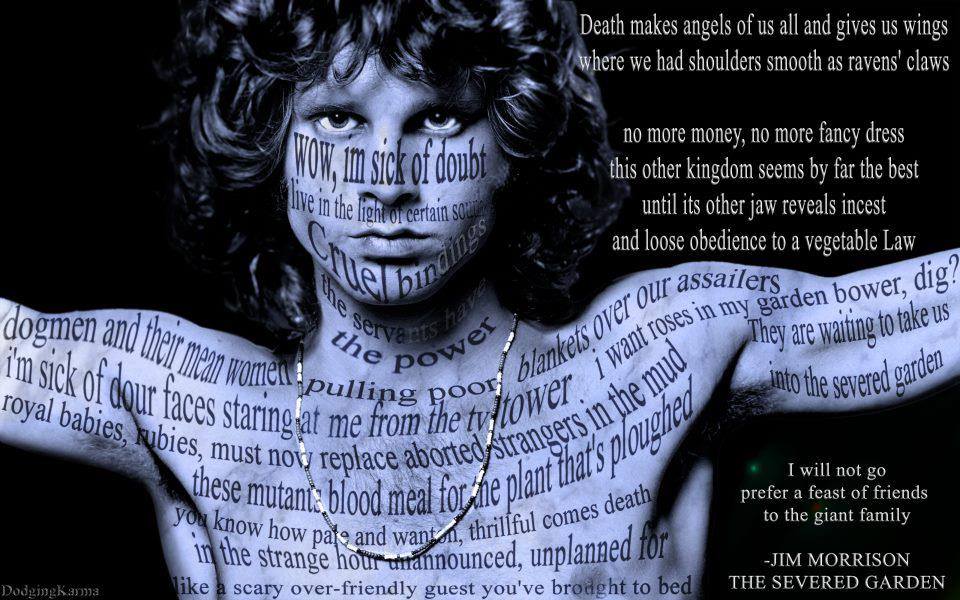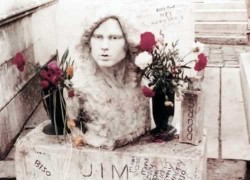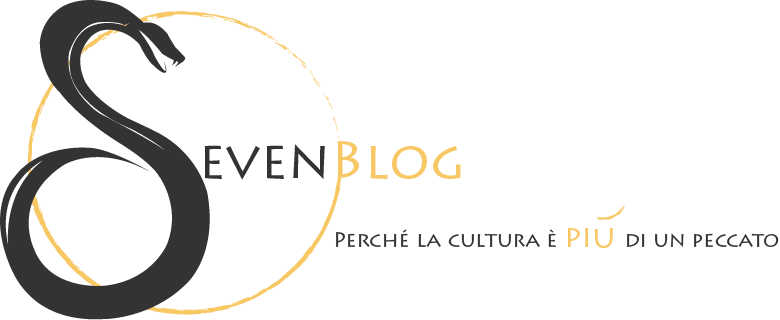
Amatorius Secretum . LUSSURIA
The seduction of death in Jim Morrison’s poems
In 27 Febbraio 2016 da Debora BorgognoniAn analysis of The Severed Garden

Extract of the poem: I – An American Prayer collection
Original book: The American Night – The writings of Jim Morrison, vol. II – published by Villard Books – New York 1990
[I] They are waiting to take us into
[II] the severed garden
[III] Do you know how pale & wanton thrillfull
[IV] comes death on a strange hour
[V] unannounced, unplanned for
[VI] like a scaring over-friendly guest you’ve
[VII] brought to bed
[VIII]
[IX] Death makes angels of us all
[X] & gives us wings
[XI] where we had shoulders
[XII] smooth as raven’s
[XIII] claws
[XIV]
[XV] No more money, no more fancy dress
[XVI] This other Kingdom seems by far the best
[XVII] until its other jaw reveals incest
[XVIII] & loose obedience to a vegetable law
[XIX]
[XX] I will not go
[XXI] Prefer a Feast of Friends
[XXI] To the Giant family
The extract of this poem was also recited by Jim Morrison with an adagio musical accompaniment and it was later called The Severed Garden from minute 1.10. It has therefore been put in the posthumous album The Doors – An American Prayer in 1978 / The Doors Original Soundtrack 1991.
The Doors - The Severed Garden (Adagio)
“They” [I] is an unknown subject. The first aspect one can note is that the word “they” serves to recall the image of Gods (polytheistic culture derived from the fascination with ancient religions in the 60s and 70s in the US – Roman religio and Greek thrēskeia, in particular the cult of Dionysus and the Bacchae, but also the neo-paganism like the Wicca religion). But these gods, then recalled other times (Kingdom [XV] – Giant family [XXI], always with the first capital letter) give the feeling of being something bad: the phrase “They are waiting to take us [I]” gives a feeling of passivity and resignation. We perceive the strict separation of the words “they” and “us” as if there were two distinct sides: the item “we” (us) can not cross the limit of the item “they”, especially as it is the item “they” to do the action of waiting (but it’s the item “us” that is really waiting): this gives the item “they” some superiority, and, at the same time, some cynicism.
The severed garden [II] is a metaphor of death. We also understand that the whole poem is an allegory of death. Death is represented with different words, that act as synonyms and that create an immutatio: severed garden [II]; death [IV][VIII]; strange hour [IV]; scaring over-friendly guest [VI]; Kingdom [XV]; Giant family [XXI].
The poet/narrator (voice that one cannot identify as a person), speaks to the reader (or readers), which is/are his accomplice/s and can understand his anguish: the poet asks a question (that doesn’t culminate with a question mark): Do you know how pale & wanton thrillfull comes death on a strange hour [III-IV]? The linguistic American English register becomes more evident with the use of the logogram “&” (ampersand) instead of the word “and”. We can note the use of the ampersand also in [IX] and in [XVII] lines. This is an informal writing, and it contrasts with the complexity of the text. This effect wes probably inspired by the beatnik poetry, but it had also been used by William Blake.
The mix of language registers (like a pastiche) is also visible with the use of the short form or the long form: “They are waiting [I]”; “we had [X]”; “I will not go [XIX]” but “you’ve brought [VI – VII]”. The only short form was probably used for giving a fast rhytm to the words: line [VI] and line [VII] are connected through enjambment. We can also notice the absence of punctuation, typical of oral tradition literature (like a ballad). The musical rhythm is also given by irregular rhymes: “dress [XIV]”, “best [XV]”, “incest [XVI]” make rhyming couplets. It is also given by the allitaration in the strophe [VIII – XII] “Death makes angels of us all & gives us wings where we had shoulders smooth as raven’s claws” with the emphasis of the sound “s”.
Regarding to puntuaction, one can note that after “garden” [II], “bed” [VII], “claws” [XII], “law” [XVII], “go” [XIX] and “family” [XXI] there could be a full stop; after “hour” [IV] there could be a question mark.Text has no dialect, but there is a mixture of commonly used words and Latin derived ones (e.g. wanton [III], derived from Middle English; thrillful [III], typical of youth language; unannounced [V], derived from Latin).
Words work as symbols of a latent death, of which the poet gives us (“us” as readers but also as counterpart of that mysterious “they”) sometimes a clue, and other times some imaginative representations. Already “the severed garden” is a metonymy (the severed garden is the
cemetery) and at the same time an ellipse: flowers are severed, but here there is a whole garden (of severed flowers). Other imaginative representations are:
- pale & wanton thrillfull death [III – IV] – representation, as a personification, of a dead person (with the adjective pale) or of a person who is no more rational (adjectives wanton and thrillfull) or, as a metaphor, of a fact that happens to everybody (wanton is also used to describe a woman who has sex with many men).
- scaring over-friendly guest you’ve brought to bed [VI – VII] – representation as a personification: this phrase draws the reader in an unpleasant feeling, the fetish and sexual side is always present, but the lover becomes annoying, “over-friendly” (adjective with the prefix over results in a negative way, even if the main word has a good meaning: friendly) and disgusting, “scaring”.
- wings [IX] and shoulders smooth as raven’s claws [X – XI – XII] – representation as an antithesis. Here we have two words in opposition: “wings” and “raven’s claws”, which are both animals parts, and both parts of a whole (synecdoche).
- fancy dress [XIV] – representation as a metaphore. Mask (fancy dress) has several meanings: a way to hide one own identity in society, a way to change personality, but it is also a game. So, it is polysemic. Fancy dress also refers to the leather clothes that Jim Morrison used to wear (in fact, he was called “the demon, dressed in black leather”).
- Kingdom [XV] – representation of death and of gods. “This other Kingdom seems by far the best” shows an enthymeme that we don’t understand. Indeed until that moment, the representation of “Kingdom” in each metaphors was unpleasant, so the reader remains displaced with the affirmation: “Seems by far the best” (reinforced by the adverb “by far”).
- its other jaw reveals incest [VI] – two metaphors: one from animal’s world (jaw) and one from a sexual idea (incest). Now the reader understands that the unpleasant feeling has been confirmed: but the word “other” refers to something that has not yet been named (it has the role of an ellipses). We just perceive that the “Kingdom” consists of two places, and we assume that they could be Life and Death, so two aspects of the same kingdom. And here is the incestuous relationship between the two ones (Is the other one generated or are they twins?). So the verb “reveals” has a literally meaning, and it transforms the previous sentence “This other Kingdom seems by far the best” in a prolepsis. The jaw is the bone that is used for eating or tear, so the complex metaphor refers to the fact that the Death decides when and how annihilating the victim.
- a vegetable law [VII] – This metaphor is a metaliterature’s quote, taken from William Blake (to whom Jim Morrison was also inspired by the name of the rock band, The Doors). The vegetative being in William Blake is in fact explained in this aphorism: «Imagination is the real & eternal World of which this Vegetable Universe is but a faint shadow» (poem: Jerusalem). Paradoxically, therefore, the “vegetable law” represents life, and the phrase “& loose obedience to a vegetable law” explain that, when death comes, it betrays life (with which it had an understanding of harmony – law canceled with incest).
- Feast of Friends [XX] and the Giant family [XXI] – two periphrasis with an alliteration of the letter “f” (Prefer a Feast of Friends To the Giant family). These two figures are opposed, and, also in this case, one means life (Feast of Friends) and the other one means death (Giant family). The word “Feast” means party, but has probably been used to recall the “festin” (french language) described by Arthur Rimbaud in the book A Season in Hell. The “festin” / Feast is an extravagant meal and at the same time something giving pleasure. From dictionary (http://www.thefreedictionary.com/feast):
- A large, elaborately prepared meal, usually for many persons and often accompanied by entertainment; a banquet.
- A meal that is well prepared and abundantly enjoyed.
- A periodic religious festival commemorating an event or honoring a god or saint.
- Something giving great pleasure or satisfaction.
 On the other hand, the Giant family (with even a reference to incest and to over-friendly guest) seems something higher. Giant in US dictionary means «extremely large, strong, powerfull, or important», that is much more than “big”.
On the other hand, the Giant family (with even a reference to incest and to over-friendly guest) seems something higher. Giant in US dictionary means «extremely large, strong, powerfull, or important», that is much more than “big”.
The poet declares, however, his security not to take part in the Giant family: “I will not go [XIX]”– The use of the “Will + infinitive” form is a decision taken at the moment of speaking but it can also mean the awareness of a future fact: in this case there would be a paradox. The last three verses build a climax of the whole poem.
Navigazione
Consigli
Articoli recenti
- Il Sandwich bologna che a Yale è proibito 24 Luglio 2024
- Mille volte ancora 23 Luglio 2024
- Quella parte che manca 21 Luglio 2024
- Bar Stories on Camera 18 Luglio 2024
- Riflessi 9 Luglio 2024


